|
|
John,
eldest son of Ernest Edward, ("Ted") and father of
the author of this history, was educated at Redditch Secondary
School, and his photograph appears in Alan Foxall's book Redditch
Remembered (the school group on page 107 is dated 1927, and
John is seated on the right hand side). A year later he was sent
off to boarding school at Wolverley, joining his Adams cousins.
He later related that Sebright School was excellent preparation
for life in the army, and he seemed to have enjoyed his time
there. His younger brother Peter was also a pupil there, but
Gordon preferred to stay in Redditch. John left Sebright in 1934, and early in 1935, as preparation for his future role in the family business, was sent as an apprentice to Harris and Matthews, Corn and Seed Merchants of Abingdon, with instructions to "keep your eyes open and your ears skinned". He was to learn all about poultry and pig feeds and mashes, also new seed packaging techniques, and to report back. His father was keen to know how Webbs compared with a similar firm in a different area. Ernest Edward ("Ted") was a Fellow of the Royal Horticultural Society (see pass card) and at one time president of the Worcester and District Association of Master Bakers, Confectioners and Millers. An article in Town and County News of August 25th 1933 gives a good overview of the family business where John was to make his mark. In outlining some of the history of Webbs of Redditch the article states that the firm was established in 1837 by William Webb, a view which was firmly held by the family over many years. Research has failed to find any basis for this - as already stated, William Webb was a fish hook maker, beer seller, baker and flour dealer, but there is no evidence of a milling business around that date. It is possible that Webbs was, even in the 1830s, associated with the business run by Ben Sarsons, miller and maltster at at 20 Church Green East, but this is pure speculation. What is good to know is that in 1933, when the article was written, Webbs was the oldest firm of its kind in the district to combine both milling and baking :(Ref 1)
Both his parents offered the usual
advice to a son living away from home - "Keep your pecker
up and never mind if you don't quite like it. Things will plan
out alright when you do your best" says his mother Lillie,
who hopes he is eating well, reminds him to eat fresh fruit,
worries that his room may not be warm enough and enquires about
the bathroom arrangements. She also advises -
His brother Gordon is interested in practical matters, such as the construction of a shack at Easemore, and other hobbies which the brothers share (Ref 3)
John is informed that Uncle Bertie is clearing his place out, though whether this is his business at The Gresham Works, or his offices in Church Green, is unclear. It is surprising that The Gresham Works had a wireless department, but John purchased items from his uncle in 1935, while he was away in Abingdon. Did the May issue of Practical Mechanic which is recommended to John, deal with wireless and crystal sets?
John has news from former school friends,(Ref 4), and is kept up to date with local and domestic news (Ref 5). 1935 marked the Silver Jubilee of George V, and Gordon is enthusiastic about the holiday from school. He asks John to keep all the Silver Jubilee stamps. The correspondents in both Redditch and Abingdon mention special parades and celebrations. The King died the following year, and there then ensued the Abdication Crisis, which coincided with the ever-growing threat of war. After about a year, having qualified as a seedsman, John returned to Redditch to take his place in the family firm. As his father had indicated, there was plenty of scope for him to develop his interest in the business. Gordon meanwhile was to take an interest in the bakery side of the business, and was sent to Croydon to gain qualifications at Bakery School. After the death of grandfather Thomas in 1917, the firm's title was sometimes abbreviated to just Webbs but later it could once again be known as Webb & Sons, now referring to Ernest Edward and his sons John and Gordon (Peter pursued other interests). However, while the boys were still young men, other factors came into play. Only two years after the cheerful exchange of letters, John returned home to Easemore one evening to find his mother Lillie dead at the foot of the stairs. She had suffered a brain haemorrhage shortly before his return. At the age of only 19 he had to give evidence at the inquest into her death, and live with the memory of it ever afterwards. Just as the family was starting to adjust to life without her, and with two sons now established in the business, war was finally declared in September 1939. John, having just celebrated his 21st birthday, had already received instructions in August of that year that he would be required for military training as from October, and he reported to the camp at Devizes. His younger brothers (see photo) joined the Home Guard until they too were called up.
We have in our possession some of the books he was issued for training (Ref 6). As a radio engineer he served on RADAR posts scattered round the UK; for details of his war service (Ref 7). The war in Europe ended in May
1945, but troop levels had to be maintained until the
surrender of Japan in August of that year. Nevertheless, the
government had been planning demobilisation for months
(Ref 8). John
was demobbed from York, having served for a total of 6 years
20 days. He had attained the rank of corporal, and on October
4th he had received a note of recommendation from the captain
commanding the 2nd Light Scout Car Field Park (Ref
9). |
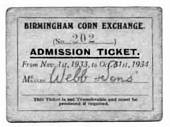
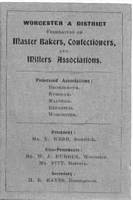
.jpg)

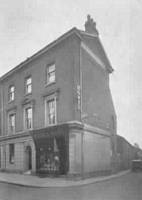 20
Church Green East in the 1930s
20
Church Green East in the 1930s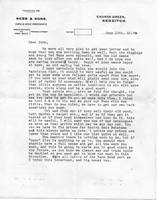
.jpg)
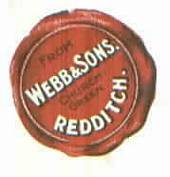
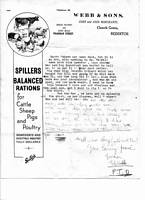
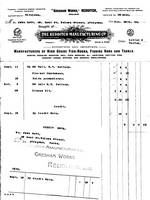
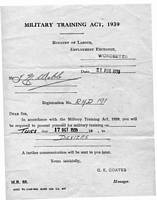
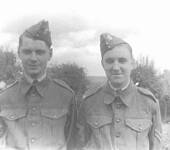 his
younger brothers in the Home Guard
his
younger brothers in the Home Guard